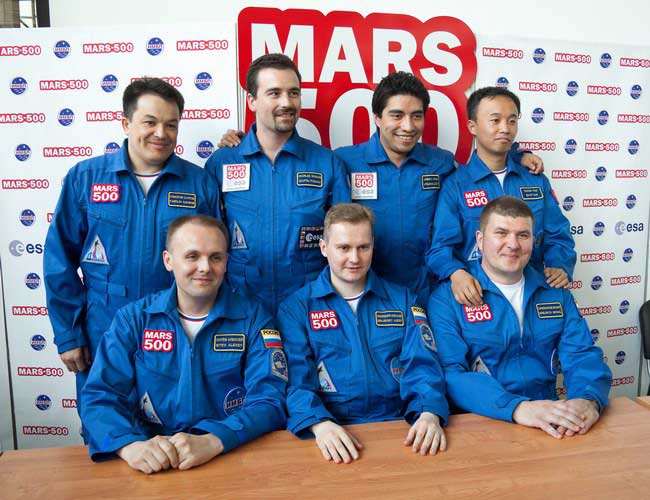On Months-Long Missions, How Durable Is An Astronaut's Mind?

As an international team of volunteers in Russia approaches the three-month mark in its ambitious simulation of a 520-day flight to Mars, researchers are keeping aclose watch on how the six men are physically and psychologically coping.
The Mars500 project began June 3 with three Russians,two Europeans and one Chinese participant sealed inside a Mars spaceshipsimulator at Russia's Institute for Biomedical Problems in Moscow.
By meticulously practicing every step of a mission to the Red Planet, the volunteers are givingscientists a close look at the psychological effects of long-duration spaceflight.[Graphic: Inside the Mars500simulator.]
As NASA sets its sights on eventual missionsto an asteroid and Mars, it is crucial to understand the physical andmental toll these voyages would take, scientists have said.
"This simulated Mars mission is by far the longest-duration study of crew confinementunder operating conditions attempted to date," said David Dinges, who isleading the only American study in the Mars500 project, a joint experiment by Russia,China and the European Space Agency. "It will have an impact on planningfor exploration missions." Dinges is a psychology professor at the Universityof Pennsylvania.
In addition to their daily routine of experiments and chores, the mock astronauts havefound ways to keep themselves busy. That included running a small betting pool onwhich national soccer team would win the World Cup.
"Well, as is usual on Earth, we decided to run a small gamble on the World Cup,"Diego Urbina, one of the participants, wrote in a blog post. "It was allfun and games until we got a winner and realized that we had nothing to pay himwith."
Breaking space news, the latest updates on rocket launches, skywatching events and more!
One long trip for humankind
The longest anyone has spent in space on a single mission is 438 days. That record was setin 1995 by Russian cosmonaut Valery Polyakov on the Mir space station. A mission to Mars would take months longer.
"We think we understand a lot of the factors that have to do with long-termisolation in space," Nick Kanas, a professor of psychiatry at theUniversity of California, San Francisco, told SPACE.com. "But the problemwith Mars is that new factors are entering in because of time delays and issuesof autonomy. These are novel ? it's time to look at what these additionalfactors mean for a Mars trip."
Kanas has conducted extensive research on the psychological factors that affect crew membersaboard the International Space Station and their corresponding mission control personnel on Earth.
Kanas and his team have studied crews that spent four to seven months isolated on thespace station. The researchers primarily have looked at four areas: changes ingroup dynamics, displacement of tension, cultural factors, and the presence orabsence of a "third-quarter effect" ? an effect of elapsed time that wouldbecome apparent just past the midpoint of the mission.
"The bottom line is that we did not find any effects of time," Kanas said."Statistically, one quarter looked like another quarter."
A third-quarter effect would have been characterized by a dip in morale, an increase indepression or tension. Researchers believe this phenomenon can occur halfwaythrough a mission as a culmination of being in a stressful, isolatedenvironment for so long.
"It's a reaction that leads to a letdown," Kanas explained. "You do somethingstressful and you get to the halfway point, and then you suddenly realize thatyou have another half to go. But we didn't find that. We think we didn't findit in our studies because there is a tremendous support network that occursbetween the crew members and ground personnel."
Some researchers have observed the effect in other studies, however.
Mars morale meltdown
Gro Sandal, a principal investigator for the 520-day Mars500 simulation and a professor ofpsychology at the University of Bergen in Norway, has conducted several studieson crew isolation and autonomy. She reported that changes in crew member moralebecame evident at the middle phase of the confinement.
"We have seen that in this period of time, the motivation of crew members seems tobe at the lowest point," Sandal told SPACE.com.
Noting that some studies did not find such an effect, Sandal said this discrepancy is probablydue to the different settings and mission characteristics involved in theexperiments.
Fighting boredom in space
Kanas and Sandal agree that maintaining crew morale through the halfway point of amission and beyond is largely contingent upon minimizing monotony and boredom.
For shorter missions, this can be done by sending surprise presents to the crew ? such asfood or other treats on support ships ? or by arranging telephone calls withtheir families or favorite movie stars.
Such steps would help to keep the crew's spirits high. But for a long-duration spaceflight like amission to Mars, they would become far more complicated, if not impossible.
"A lot of these countermeasures will not be available to people going to Mars,"Kanas said. "There will be a tremendous time delay ? up to 44 minutes round trip. So ifyou ask a question from Mars and the planet is on the other side of the sun,you're going to have to wait 44 minutes or so to get an answer from groundpersonnel on Earth."
This will certainly require changes to how crews communicate with mission control and howproblems are dealt with.
"You have to anticipate delays and come up with a strategy," Kanas explained."You can't send up a surprise present because it's going to take six toeight months to get there. Plus the crews will be very autonomous. They won'tbe getting their schedules every day, so they'll be planning a lot of their owndaily schedules."
Mars crew dynamics
The Mars500 experiment is a unique opportunity for researchers to observe some of thesedynamics, researchers said.
"The autonomy and isolation of the crew will have an impact on psychologicalparameters," Sandal said. "During a mission to Mars, the crew willnot be able to rely on the same level of support from Earth as, for example,during ISS missions. So the crew's isolation is going to be much stronger, andthis, in combination with the longer duration and lack of continuous supportfrom Earth, will be an important aspect which will be simulated duringMars500."
Researchers are also hoping Mars500 sheds light on what factors to consider in selecting crewsfor future long-duration missions. When the voyage itself could last severalyears, crew composition becomes an integral part of the mission's success.
- Gallery- Mars Base of the Future
- The Best and Worst Mars Landings Ever
- Video - How European Astronauts May Go to Mars
This report is the first in a two-part series on long-duration spaceflight thatexamines some of the major issues that will be studied throughout the Mars500simulation. Part Two discusses the importanceof crew selection.

Denise Chow is a former Space.com staff writer who then worked as assistant managing editor at Live Science before moving to NBC News as a science reporter, where she focuses on general science and climate change. She spent two years with Space.com, writing about rocket launches and covering NASA's final three space shuttle missions, before joining the Live Science team in 2013. A Canadian transplant, Denise has a bachelor's degree from the University of Toronto, and a master's degree in journalism from New York University. At NBC News, Denise covers general science and climate change.
